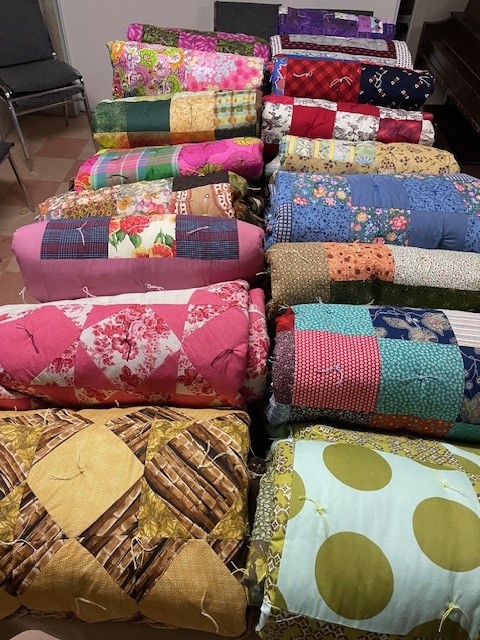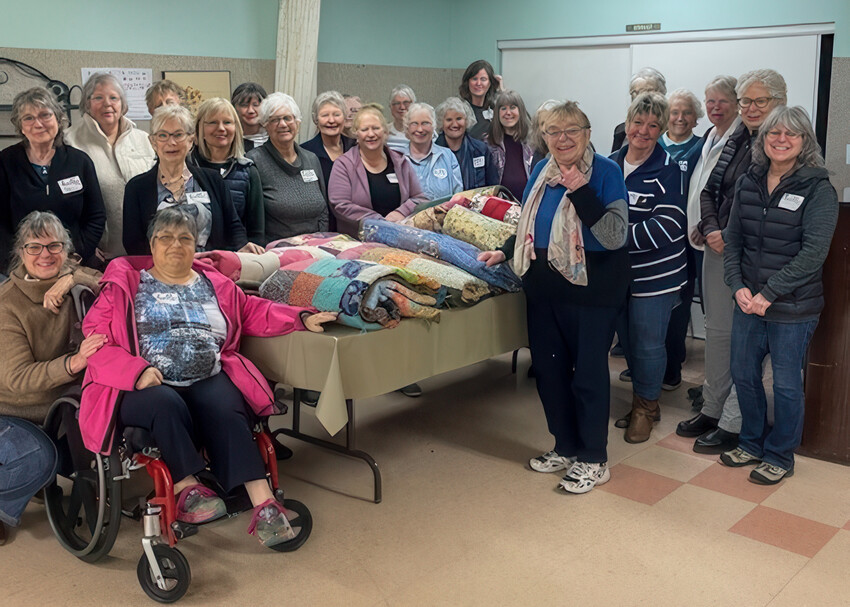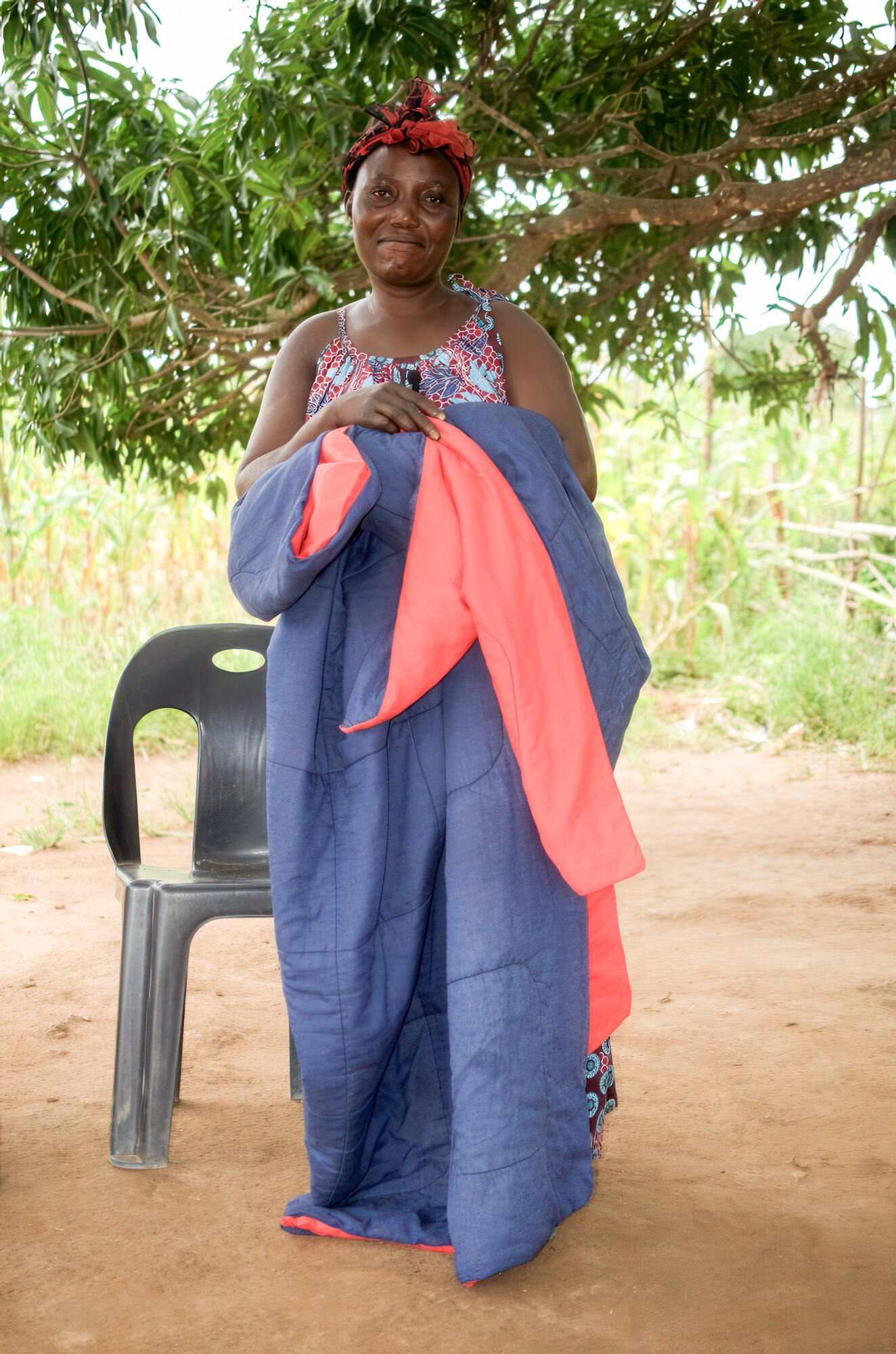Comforters keep refugee children, elderly people warm on cold Zambian nights
Great winter warm-up keeps comforters coming
A comforter, made of colorful squares within squares, serves a double purpose in Azel Cyizanye’s one-room house in a Zambian refugee settlement camp.
During the day, the 89-year-old refugee hangs the comforter across a line in her room to divide her sleeping area from the sitting area. At night she takes the comforter down to cover herself and stay warm.
During the winter months in Zambia, June to August, the weather gets very cold, sometimes too cold for only one comforter, she says. At other times of the year, it’s hot during the day, but cold at night.
Cyizanye is one of 1,100 recipients in the camp to get a comforter made by Mennonite Central Committee (MCC) volunteers. Brave Heart Foundation has distributed them to children and people who are elderly in Meheba Refugee Settlement Camp during the past three years.
In addition, the foundation distributes MCC’s canned meat, sewing kits, school kits and hygiene items to people at the camp. Most of the refugees have fled violence in central and eastern Africa.
Cyizanye came to the refugee settlement in 1998 from Rwanda after all her children were killed during the Rwandan genocide. She was about 62, she says.
“By a miracle, I escaped. I arrived in Meheba camp empty-handed, not even clothes. After such a long journey, crossing Rwanda, then the Democratic Republic of the Congo (DR Congo) and Angola before reaching Zambia on foot, what could I have carried with me?” she asks.

In 2025, MCC challenged volunteers to make 7,000 comforters from January to March. The goal was met with 18,367 total comforters donated from people in Canada and the U.S.
Brenda Neufeld responded to the challenge. Harmony Hearts, her women’s group from Black Creek United Mennonite Church on Vancouver Island, British Columbia, invited the local community to make comforters with them. She advertised the church’s Great Winter Warm-up event, held on Feb. 22, through social media, posters and word of mouth.
As a result, 14 new people, many who did not have experience making comforters, came out that Saturday to join 19 experienced people. The newcomers soon learned to tie the knots that fasten three layers of fabric together. Together, they finished 17 comforters that day.

“This year I was excited because we actually got people who had no connections to any of us,” says Neufeld. “Very often, it's a friend of a friend, but this year we had people come just from seeing it on Facebook or from a poster, and we didn’t know them. They came because it’s such a good cause. There seemed to be a heart for it this year.”
In addition to this event, every Friday morning throughout the year, people from local churches and participants from previous Great Winter Warm-ups gather in the church basement to work on comforters. Individuals usually piece the comforter tops in their homes, but at church the women finish the edges and tie the comforters.
So far in 2025, the group has finished 75 comforters. When it’s time to deliver them to the MCC office in Abbotsford, a volunteer will drive one and half hours to the car ferry, take a 90-minute ride across the Strait of Georgia to the mainland, and then drive another hour to the MCC office in Abbotsford.

The work and dedication of so many volunteers is appreciated wherever the comforters are distributed.
“Please keep up the good work you are doing. May our almighty God continue blessing you,” says Ngala Chikwela Mulume, a 102-year-old man who lives in Meheba Refugee Settlement Camp. He came from the DR Congo with his children in 1993. He, too, used to work with his hands to make stools from bamboo and sell them. Now his son takes care of him.
“Considering my age, it (the comforter) has helped me stay warm at night and also during the daytime because most of the time I am indoors,” he says.

In the same camp, Astridah Nyemba, a mother of six children, ages 4 to 19, says she was very grateful for the comforters she received.
"My children didn’t have enough blankets to cover themselves,” she says. “As you know, it gets cold in winter. Receiving three comforters brought joy to my children. Before that, they were sharing two blankets which were not warm enough.”
Nyemba, who makes and sells flatbread and waffles, says if she had an opportunity to sit down and talk with comforter-makers over a cup of coffee or tea, she would thank them for their kind gesture.
“I would also encourage them to continue making them with the same good quality and beautiful colors,” she says.

